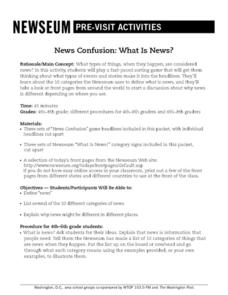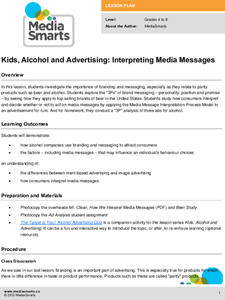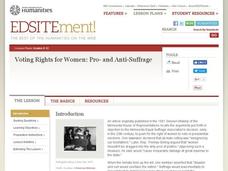Curated OER
Lesson: Creating a Superhero Sculpture
Indian art depicts an amazing pantheon of gods and goddesses, each having interesting powers and purposes. Young art historians use the provided images to analyze a carved sculpture of a monkey-god. They then brainstorm the attributes...
Newseum
Are You a Publisher?: Free Press and You
What kinds of media do your pupils use to read and publish information? After a discussion about what publishing means, and about the freedom of the press, class members interview one or two other people about their publishing habits....
Newseum
News Confusion: What Is News?
Use headlines to help your learners understand what news is. First, present a list of categories to your class. Then instruct small groups to play a game in which they sort headlines into the categories. Discuss the result and examine...
Newseum
The Medium Shapes the Message
Where do you get your news? Have learners examine four different publications and decide which one they would choose to read on their own time. The resource includes a list of publication types to supply and a worksheet for groups...
National Endowment for the Humanities
Remember the Ladies: The First Ladies
Young historians name at least five First Ladies, describe something significant each did, and state five traditional duties of First Ladies. They discuss some untraditional things First Ladies have done as well.
Curated OER
Life in Old Babylonia: The Importance of Trade
Middle schoolers read maps and artifacts for information indicating the existence of a trade network in Old Babylonia and beyond. They list goods imported to and exported from Babylonia. They indicate trading centers on a map of ancient...
Media Smarts
Kids, Alcohol and Advertising - Interpreting Media Messages
Young scholars investigate the importance of branding and messaging, especially as they relate to party products like alcohol.
Curated OER
Voting Rights for Women: Pro- and Anti-Suffrage
Students examine the arguments for and against suffrage for women in the 19th and early 20th centuries. They explore various websites, read and discuss primary source documents, develop a document from two points of view, and analyze...
Denver Art Museum
Lesson: High Prestige and Status
Prestige and status have been symbolized in many different ways throughout human history. Young art historians analyze an ancient Panamanian medallion for symbols of prestige and status, and then generate a list of other symbols of...
iCivics
You've Got Rights!
If aliens invaders nearly destroy the world in the distant future and leaders must decide on a pamphlet of protections to preserve individual rights, what should they include? Introduce the Bill of Rights and the struggle between the...
PBS
Alexander Hamilton: Lawyer, Writer, and Founding Father
Scholars analyze the impact Alexander Hamilton had on the creation of the United States. Primary documents and video clips give learners a glimpse into the life of one of America's Founding Fathers, arming them with enough information to...
PBS
Elizabeth Cady Stanton: Orator, Author, and Activist
Have you ever felt like your opinion doesn't count? Scholars research and analyze the impact Elizabeth Cady Stanton had on women's rights. Primary and secondary sources as well as video clips give individuals a clear picture of Stanton's...
PBS
Alexander Graham Bell: Scientist, Inventor, and Teacher
Hello? Hello? Scholars investigate the impact Alexander Graham Bell's telephone had on the American landscape. Using drawings, video clips, and primary sources, the mind of the inventor comes to light as pupils dream of new inventions to...
PBS
Thomas Edison: Inventor and Entrepreneur
How many of Thomas Edison's inventions do your scholars use every day? They might be shocked to find out! Young historians watch a video, analyze a photograph, and read one of Edison's letters to learn more about his life and impact....
PBS
Walt Whitman: Journalist and Poet
Can you love something so much you want to change it? Young patriots investigate Walt Whitman's love of America—and his suggestions to improve it—using primary sources as well as video evidence. Scholars research American issues of the...
PBS
Mark Twain: Storyteller, Novelist, and Humorist
Scholars investigate the use of satire in Mark Twain's writing. Literary lovers research the Adventures of Huckleberry Finn and Tom Sawyer, political cartoons, and videos to see how Twain uses satire to make the stories more memorable....
PBS
Amelia Earhart: Aviator, Record-Breaker, and Activist
Fly through the gender barrier! Scholars investigate the impact Amelia Earhart had on American aviation and society. After watching a brief biographical video, learners take a look at primary documents to gain insight into her intriguing...
PBS
Eleanor Roosevelt: First Lady, Diplomat, and Activist
Scholars analyze the impact Eleanor Roosevelt had on not just the nation, but also on the world. Primary sources and video clips help form a picture of the First Lady and her accomplishments. As a final activity, individuals create...
Judicial Learning Center
Your Day in Court: Criminal Justice
When a person goes on trial for a crime, what options does a court have to render justice? Who are the key players in the legal system? Interested legal scholars answer the inquiries and more using an Internet-based activity, chart, and...
Judicial Learning Center
About Federal Judges: Qualifications of Judges
"Help Wanted: A Supreme Court Justice." What should be included in the ad? Learners ponder the question during a lively activity that asks them to examine the qualifications for various federal offices and then create job postings....
Judicial Learning Center
The Bill of Rights and Civil Liberties
Why is the Bill of Rights so important to American's civil liberties? An important resource helps scholars find these answers and more by reading through state and federal constitutions to discover their own civil liberties. The activity...
Judicial Learning Center
Article III WebQuest
Why is Article III of the constitution so significant? Pupils discover the importance of Article III and how it relates to past as well as current events by completing Internet research using a provided handout. They learn everything...
Judicial Learning Center
How to Create a Law
Laws affect everything from a scholar's favorite public park to rules in the classroom. Express the importance of lawmaking and teach how they relate to every facet of life with a resource on how a bill becomes a law.
PBS
Cesar Chavez: Labor Leader and Civil Rights Activist
Cesar Chavez believed so much in the cause of farmworkers that he put his money where his mouth was. Chavez quit his well-paying job to organize them into labor unions. Using a speech, photograph, and short biographical video, pupils...
Other popular searches
- Alberta Social Studies Plan
- Social Studies Plan Canada
- Social Studies Plan Africa
- Social Studies Plan Wwii
- Social Studies Plan Dictator
- Social Studies Plan Eskimos
- Lesson Plans Social Studies
- Social Studies Plants
- Unit Plan Social Studies
- Social Studies Lesson Plan Ell
- Unit Planning Social Studies























